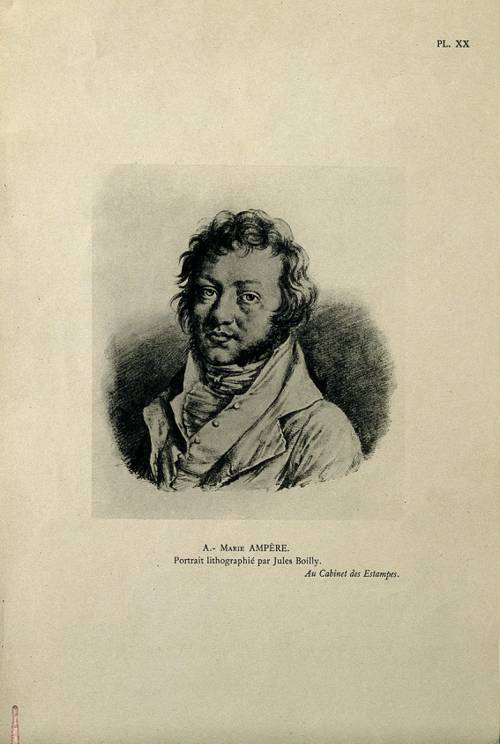
FAQ About André-Marie Ampère

Who was André-Marie Ampère?
André-Marie Ampère was a French physicist and mathematician who is credited as one of the founders of classical electromagnetism. He was born on January 20, 1775, in Lyon, France, and made significant contributions to the field of electrodynamics, particularly with Ampère's law, which describes the magnetic forces between electrical currents.

What is Ampère's law?
Ampère's law is a fundamental principle of electromagnetism that relates the magnetic field in a region to the electric current that produces it. It is mathematically expressed through integral or differential forms and forms backbone concepts influencing the design and functioning of electrical circuits and devices.

What contributions did Ampère make to electromagnetism?
André-Marie Ampère's most substantial contribution to electromagnetism was formulating Ampère's law. He also coined some fundamental terminology in electromagnetism, including terms like "current" and "electrodynamics," pioneering the field through his theoretical and experimental work.

How did André-Marie Ampère's discoveries impact technology?
Ampère's discoveries laid the groundwork for much of modern physics and electrical engineering. His insights into magnetism and electricity paved the way for the development of technologies like the electric motor and electrical circuits that are integral to countless modern devices and infrastructures.

What are some notable works of André-Marie Ampère?
One of Ampère's notable works is his book "Mémoire sur la théorie mathématique des phénomènes électrodynamiques uniquement déduite de l'expérience" which outlines his theories and experiments on electrodynamics. This publication emphasized the derivation of key principles solely from experimental results.

What are some key terms coined by Ampère in electromagnetism?
Ampère introduced several key terms that are still in use today, including "current" and "electrodynamics." His work contributed significantly to the vocabulary and foundational concepts used in modern electromagnetism.

Why is the unit of electric current named Ampere?
The unit of electric current, the Ampere, is named in honor of André-Marie Ampère for his pioneering contributions to the study of electromagnetism. It is a standard unit of measure within the International System of Units (SI), reflecting his impact on the field.

When did André-Marie Ampère present his work on electromagnetism?
Ampère formally presented his groundbreaking work on electromagnetism in 1820, following Hans Christian Ørsted's discovery of electromagnetism. His presentations and publications rapidly advanced the understanding and application of electromagnetic principles.

How did Ampère's work influence future scientists?
Ampère's pioneering theories and laws significantly influenced later scientists, including James Clerk Maxwell, who further developed electromagnetic theory into the comprehensive framework we study today. His work laid a critical foundation for future research and technological development.

What was André-Marie Ampère's educational background?
Ampère received an eclectic education at home, where he was schooled primarily by his father. Although he did not attend formal university education as a young man, his autodidactic endeavors led him to mastery in mathematics and physics, allowing him to make groundbreaking contributions to these fields.

What challenges did Ampère face in his early career?
Ampère's early career was marked by the turbulence of the French Revolution, which impacted his family's fortune and interrupted his education. Despite these challenges, he overcame personal and professional obstacles to achieve significant scientific breakthroughs.

Did Ampère have any significant collaborations in his work?
Although Ampère did not have formal collaborations akin to modern scientific partnerships, he did correspond and exchange ideas with other leading scientists of his time, including François Arago and Augustin Fresnel, which influenced his understanding and dissemination of electromagnetic concepts.

What honors did André-Marie Ampère receive for his work?
During his lifetime, Ampère was recognized by his peers for his scientific achievements, though he did not receive many formal awards. Posthumously, his legacy was honored by naming a unit of electric current after him, and he is celebrated as a key figure in the chronicles of physics.

What is the historical significance of Ampère's work?
Ampère's work represents one of the cornerstones of classical electromagnetism, fundamentally shaping the study of electricity and magnetism. His theories enabled future technological advancements, from telegraphs to computers, and laid a foundation for much of the 20th-century innovation.

How were Ampère's theories experimentally verified?
Ampère’s theories were experimentally verified through rigorous experimentation that demonstrated the relationship between electric currents and magnetic forces. These experiments often involved sophisticated setups to measure the forces at play and played a pivotal role in validating his laws.

What did Ampère theorize about electricity and magnetism?
Ampère theorized that electricity, when moving through a conductor, produces a magnetic field around it. This insight helped to unify the previously separate studies of electricity and magnetism into the field of electrodynamics, forming a critical component of classical electromagnetism.

In what ways did Ampère's personal life influence his work?
Ampère’s personal life, particularly the loss of his wife and challenges during the French Revolution, deeply influenced his emotional and intellectual journey. Despite these difficulties, his passion for science drove him to concentrate intensely on his work, leading to extraordinary achievements.

What is an interesting fact about André-Marie Ampère?
An interesting fact about Ampère is that he was primarily self-taught in his youth, relying on his own initiative to delve into mathematics and philosophy—demonstrating an exceptional capacity for learning that propelled his later scientific achievements.

How did Ampère's discoveries help practical applications in electricity?
Ampère's exploration of electromagnetism directly facilitated the design of electric motors and generators, which are keystones of modern electrical engineering. His discoveries also assist in forming principles that guide the construction and operation of various electronic devices today.

Did André-Marie Ampère contribute to any other scientific fields?
Apart from his paramount work in electromagnetism, André-Marie Ampère also made contributions to mathematics and philosophy. He was interested in a broad range of scientific inquiries, as reflected in his involvement in various scientific societies and his diversified academic interests.
